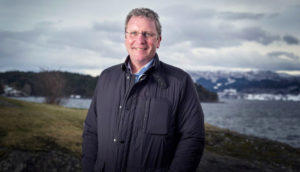Grieg reports loss for Q4 in ‘challenging year’

Grieg Seafood has excluded Shetland from its main 2020 fourth quarter results published today, which show an operating loss of NOK 17m (£1.45m).
The Shetland performance is contained as a separate item at the end of a lengthy Q4 report which shows the division harvested 3,103 tonnes during the final three months of 2020, an increase of 33 per cent on the previous year and 15,705 tonnes for the whole year.
There was as yet no indication of whether a sale is on the horizon although when Grieg made the announcement in November it said it hoped to have it completed by the end of this year.
The report said: “Significant volumes were harvested from the Isle of Skye during the quarter, which has been affected by severe biological challenges. The increased volume was offset by low market prices and low price achievement on small fish from sites at Isle of Skye.”
Grieg said costs in Shetland remain high due to issues with gill health, plankton and sea lice, but initiatives to improve biological performance, including more robust smolt, have increased survival to 89 per cent over the past 12 months.
The report adds: “At year end 2020, only one farm remained with fish on the Isle of Skye, which will be harvested in Q1 2021. Production on mainland Shetland continued positively during the quarter.Operating income from the disposal group Shetland amounted to NOK 196.2m (£16.7m) in Q4. EBIT was impacted by high cost, impacted by the biological challenges at Skye. “
Grieg also commented on the implications of Brexit: “[The] UK left the European Union at year end 2020. The outcome of Brexit still represents an uncertainty for the Scottish salmon farming industry and Norwegian exporters, due to possible tariffs on trade and logistical problems of getting fresh salmon from Norway to the UK and from UK to the rest of Europe.
“So far, our sales have not been affected by Brexit. Approximately 68% of farmed Scottish salmon was destined for markets outside the UK in 2019. For Grieg Seafood Shetland, 20% of the volume in 2019 went to other markets.”
“Approximately 20% of our employees in Scotland 44 are EU citizens. We have assisted them and their families to apply for settled status, which gives them permission to continue to live and work in the UK.”
The report also highlights the impact of global warming, which it says is likely to present a range of challenges to the aquaculture industry. It states: “Without proactive adaptation, salmon farming may become more vulnerable to physical risks such as damages caused by extreme weather, disease due to higher seawater temperature, in addition to regulatory risk, technology risk, market risk and reputational risk.”
Group CEO Andreas Kvame told investors: “We have strengthened our operational capabilities with a new and more farming oriented organisational setup, and with a potential sale of our Shetland operations, we are narrowing our focus to Norway and Canada as strong production regions.
“We have also started our journey to take a stronger market position with a new and integrated sales and marketing organization.
Kvame added: “Overall, 2020 has been a challenging year. We did not deliver on our ambitions, not only because of Covid-19 but also due to biological challenges in several regions.
“We have taken important steps to remedy the situation. As we are starting to see the light in the end of the tunnel and a post-Covid-19 world, Grieg Seafood continue the journey of improvement, with the aim of creating long-term value for all our stakeholders.”
Group harvest volumes (excluding Shetland) totalled 20,271 tonnes in Q4 and 71,142 tonnes for the full year which was below the expected 75,000 tonne figure due to ISA challenges in the Finnmark region of Norway. Rogaland and British Columbia produced good biological performances.
The company’s group operational loss of NOK 17 million excludes the Shetland sites.
Grieg said the Covid-19 pandemic had disrupted the salmon market with a significant shift in demand and lower prices in core markets. The statement says: “Despite the challenging circumstances, demand for Atlantic salmon remains strong and Grieg Seafood has been able to maintain efficient operations throughout the quarter.”

Andreas Kvame

